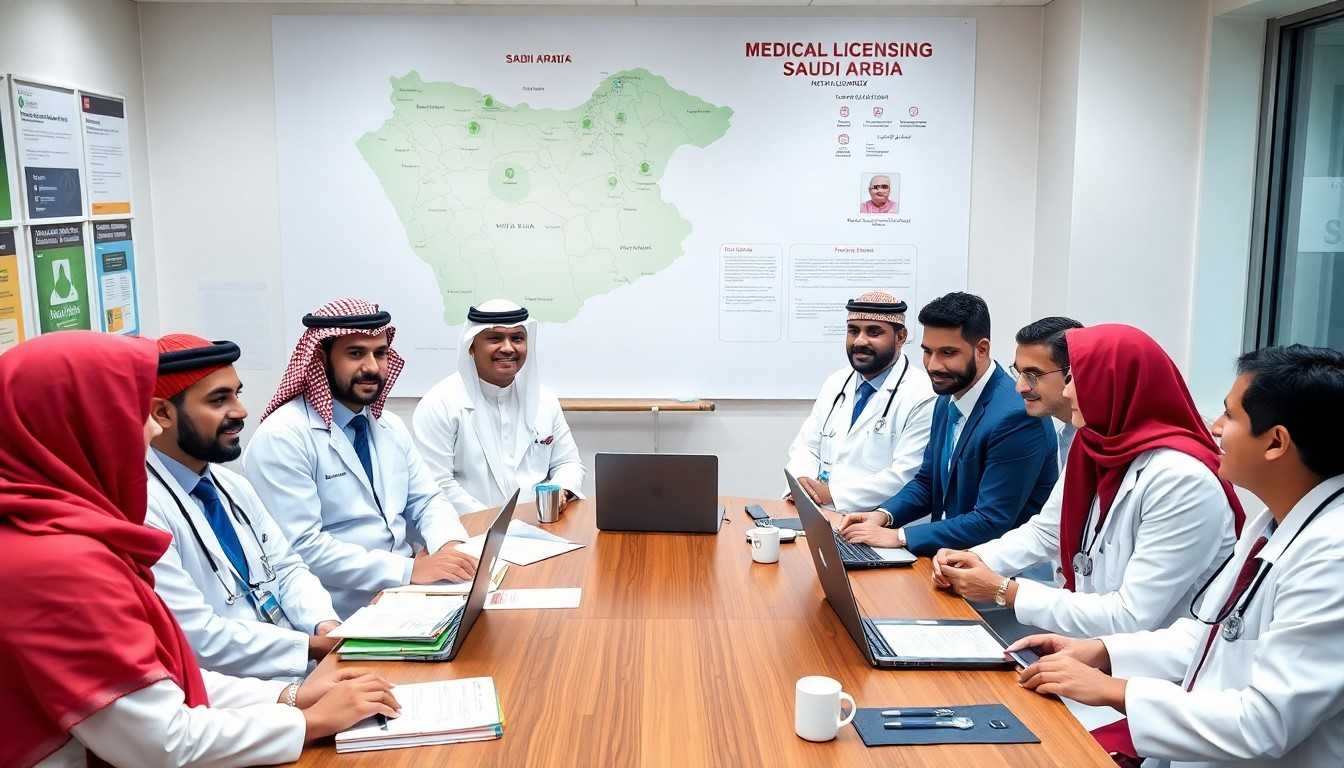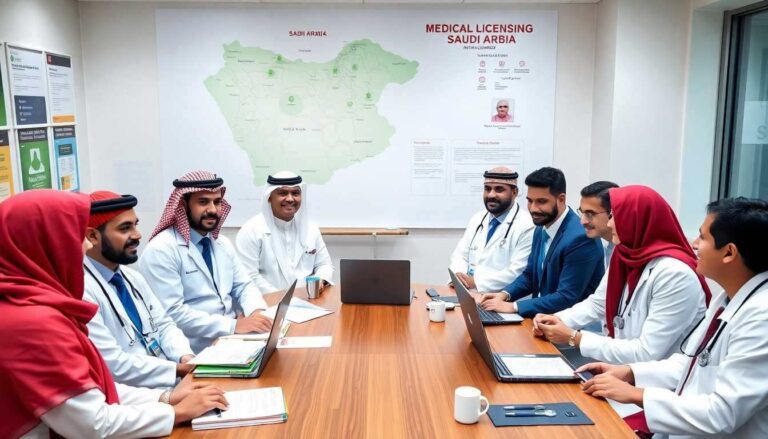Just like you, I understand the mix of excitement and uncertainty when planning to practice medicine in Saudi Arabia. As someone who’s helped numerous doctors through this process, I want to guide you through the medical licensing journey in the Kingdom.
Whether you’re a seasoned practitioner or a recent graduate, obtaining a license from the Saudi Commission for Health Specialties (SCFHS) is your gateway to exceptional career opportunities in Saudi healthcare.
While the process might seem complex, I’m here to break it down into manageable steps and help you avoid common pitfalls that could delay your application.
Key Takeaways:
- SCFHS Licensing requires specific educational qualifications, work experience, and language proficiency in Arabic
- International doctors must pass the Saudi Medical Licensing Exam (SMLE) and complete registration through the Mumaris Plus Portal
- Primary Source Verification through DataFlow is mandatory to authenticate all educational and professional credentials
- The process involves various licensing fees and documentation costs that should be planned for in advance
- Understanding Saudi cultural norms and healthcare workplace etiquette is crucial for successful integration
- Saudi Arabia offers attractive financial benefits including competitive salaries and tax-free income
- Access to modern medical facilities and professional growth opportunities make it an attractive destination for international doctors
Overview of Medical Licensing in Saudi Arabia

Current Healthcare Landscape
At present, Saudi Arabia’s healthcare system is experiencing rapid growth and transformation, making it an attractive destination for international medical professionals.
I can tell you that the Kingdom has invested heavily in developing state-of-the-art medical facilities and implementing advanced healthcare technologies across its major cities, particularly in Riyadh.
Regulatory Framework
Against the backdrop of this healthcare evolution, the Saudi Commission for Health Specialties (SCFHS) serves as the primary regulatory body overseeing medical licensing. I want to emphasize that the SCFHS maintains strict standards to ensure high-quality healthcare delivery throughout the Kingdom.
Regulatory requirements include primary source verification, professional qualifications assessment, and successful completion of licensing examinations. This comprehensive approach helps maintain the highest standards of medical practice in Saudi Arabia.
Types of Medical Licenses
Framework for medical licensing in Saudi Arabia includes various categories:
| License Type | Requirements |
|---|---|
| Temporary | Valid degree + 1 year experience |
| Permanent | 3 years experience + SCFHS exam |
| Specialist | 5 years experience + specialty certification |
| General Practice | Basic medical degree + licensing exam |
| Consultant | 8 years experience + advanced certification |
Considering your professional background, you’ll need to determine which license category best suits your qualifications:
- Educational requirements
- Years of experience
- Specialty certifications
- Language proficiency
| Documentation | Processing Time |
|---|---|
| Medical Degree | 2-3 weeks |
| Experience Certificates | 3-4 weeks |
| Professional References | 1-2 weeks |
| Language Certification | 1 week |
| Identity Documents | 1 week |
Any questions about specific license requirements can be addressed through the SCFHS portal or your licensing consultant.
Saudi Commission for Health Specialties (SCFHS)

Role and Functions
Across my experience helping international doctors, I’ve found that SCFHS serves as the primary regulatory body for healthcare professionals in Saudi Arabia.
It’s responsible for setting and maintaining healthcare standards, evaluating qualifications, and issuing professional licenses to medical practitioners like you who wish to work in the Kingdom.
I want you to know that SCFHS oversees the accreditation of healthcare programs, conducts professional examinations, and provides continuous medical education opportunities.
Your journey to obtaining a medical license will be closely monitored by this organization, which has successfully licensed over 600,000 healthcare practitioners since its establishment.
Organizational Structure
Among the various departments at SCFHS, you’ll interact primarily with the Professional Classification and Registration Department, which handles your licensing application, and the Assessment and Examination Department, responsible for conducting your qualifying exams.
The Training and Development Department will become relevant once you start practicing, as they oversee continuing medical education requirements.
In fact, I should mention that SCFHS operates through a network of regional offices across Saudi Arabia, with the main headquarters located in Riyadh.
These offices work together to ensure consistent application of healthcare standards and provide support to healthcare professionals like you throughout their careers in Saudi Arabia.
Communication Protocols
Below are the main channels through which you can interact with SCFHS. The Mumaris Plus portal serves as your primary platform for submitting applications, tracking progress, and managing your professional profile. You can also reach out through their customer service hotline, which operates from Sunday to Thursday, 8 AM to 4 PM Saudi time.
Communication with SCFHS has been streamlined in recent years, and I’m pleased to tell you that they now offer multi-language support services to assist international healthcare professionals like yourself. You can expect responses to your queries within 48-72 hours through their official channels.
Eligibility and Qualifications Requirements
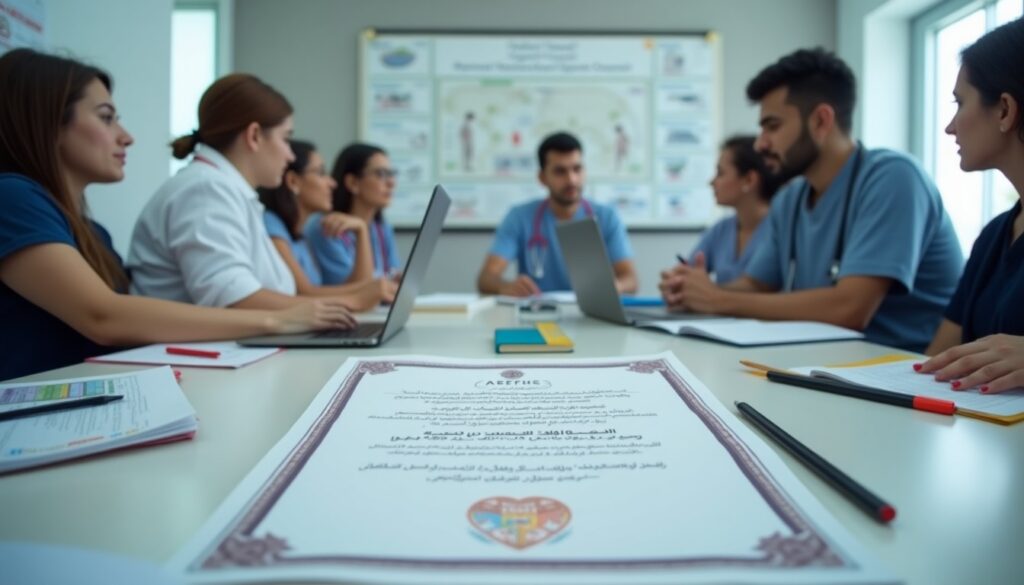
Academic Prerequisites
By taking your first step towards practicing medicine in Saudi Arabia, I want to make sure you understand the important academic requirements. You’ll need to have a medical degree from an accredited institution recognized by the Saudi Commission for Health Specialties (SCFHS).
I should mention that your medical school must be listed in the World Directory of Medical Schools, and you’ll need to have completed a minimum of 7 years of medical education, including internship.
Experience Requirements
After obtaining your medical degree, you must have at least 2 years of clinical experience in your home country or any recognized healthcare facility.
I want to emphasize that this experience should be post-registration and in your specific specialty area. Your experience must be verifiable and include direct patient care responsibilities.
Also, I need to point out that if you’re applying for a specialist position, you’ll need additional 3-5 years of experience in your specialty field, along with relevant board certification or fellowship training.
The quality of your experience matters significantly, so make sure your roles involved hands-on clinical practice.
Documentation Needs
Before you begin the application process, I recommend gathering all required documents. You’ll need to submit your original medical degree, professional licenses, detailed experience certificates, and a valid passport. Each document must be properly authenticated by relevant authorities in your home country.
Considering the complexity of the verification process, I advise you to prepare certified Arabic translations of all your documents. The DataFlow Group will verify your credentials through their Primary Source Verification (PSV) system, which typically takes 15-30 working days. Make sure to maintain clear scanned copies of all your documents for future reference.
Saudi Medical Licensing Examination (SMLE)

Examination Structure
After deciding to pursue your medical career in Saudi Arabia, you’ll need to understand the SMLE format. The exam consists of 300 multiple-choice questions that you must complete within a 4-hour time frame.
I want you to know that these questions cover various medical specialties, including internal medicine, surgery, pediatrics, obstetrics and gynecology, and family medicine.
After entering the examination room, you’ll find that the questions are presented in English and follow a clinical scenario-based format. I recommend paying special attention to the patient safety and medical ethics sections, as these typically constitute about 15% of the exam content.
Study Resources
Before starting your SMLE preparation, I suggest gathering comprehensive study materials. The SCFHS official website offers sample questions and exam blueprints that are invaluable for your preparation. You can also access online question banks and review courses specifically designed for SMLE preparation.
Further to help you succeed, I recommend joining study groups with other international doctors preparing for the SMLE. Many candidates find that collaborative learning and sharing experiences significantly enhance their preparation process.
Scoring System
Along with understanding the exam structure, it’s important to know how the SMLE is scored. The passing score is set at 60%, but I advise aiming higher to ensure success.
Your performance is evaluated using a standardized scoring system that takes into account the difficulty level of questions.
Scoring results are typically available within 2-3 weeks after the exam date. If you don’t pass on your first attempt, don’t worry – you can retake the exam after a waiting period, but I recommend using this time to strengthen your weak areas and improve your preparation strategy.
Mumaris Plus Portal Navigation
Not just another online platform, Mumaris Plus is your imperative gateway to obtaining medical licensing in Saudi Arabia. Before entering into the portal, I recommend checking out A Complete Guide to the Saudi Medical Licensing Exam to understand the overall process better.
Account Creation
Creation of your Mumaris Plus account starts with visiting the SCFHS official website. I want to emphasize that you’ll need to provide your valid email address and personal identification details to initiate the registration process.
During account setup, you’ll receive a verification code to your registered email. I’ve found that it’s important to complete the verification within 24 hours to avoid any registration delays.
Document Submission
Around 80% of application delays happen due to incorrect document submissions. I recommend preparing your educational certificates, professional qualifications, and valid passport copies in advance before starting the upload process.
Further into the document submission process, you’ll need to provide additional materials like your updated CV, recent passport-size photographs, and proof of experience. I’ve noticed that PDF format is preferred for all document uploads, and each file should not exceed 2MB in size.
Application Tracking
One of the most useful features I’ve discovered in Mumaris Plus is the real-time application tracking system. You can monitor your application status 24/7 and receive automatic notifications about any updates or required actions.
In fact, the tracking system provides detailed insights into each stage of your application process. I’ve found that you can easily identify if there are any pending requirements or documentation gaps that need your attention, helping you avoid unnecessary delays in obtaining your license.
DataFlow Verification Process
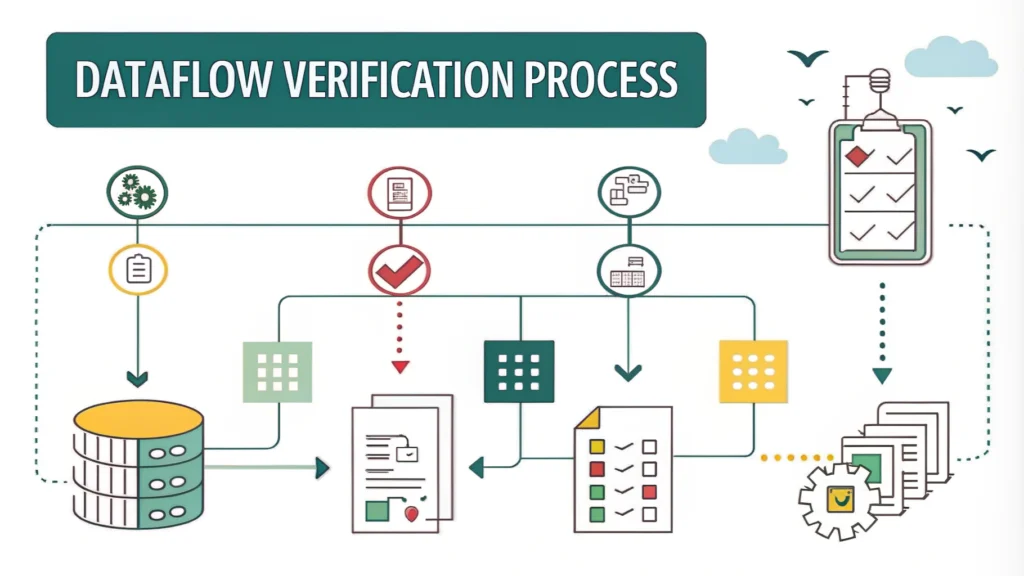
All international doctors seeking to practice in Saudi Arabia must complete the DataFlow verification process – a mandatory security measure that validates your educational and professional credentials. Before taking the Saudi Prometric Exam for Doctors, you’ll need to clear this imperative step.
Required Documents
Behind every successful DataFlow verification is a complete set of properly prepared documentation. I recommend you prepare your original medical degree, professional licenses, work experience certificates, and passport – all of which must be current and valid.
I want to emphasize that all your documents must be in English or Arabic, with any translations done by certified legal translators. You’ll also need to provide clear, color scans of these documents through the DataFlow online portal.
Verification Timeline
Process times for DataFlow verification typically range from 15 to 45 working days, depending on how quickly your previous institutions respond. I’ve noticed that applications with complete documentation tend to process faster.
Indeed, you can track your verification progress through the DataFlow online portal, which I find particularly helpful for staying updated on your application status. The system will notify you if any additional documents are needed, helping to avoid unnecessary delays.
Common Issues
Verification delays often occur due to incomplete documentation or response delays from previous institutions. I’ve found that the most common roadblocks include expired documents, missing employment letters, or inconsistencies in personal information across different documents.
Plus, to help you avoid potential setbacks, I recommend maintaining active communication with your previous employers and educational institutions. Quick responses to verification requests from these institutions can significantly speed up your application process.
Financial Considerations
Despite the attractive tax-free income and excellent benefits of practicing medicine in Saudi Arabia, as outlined in Moving to Saudi Arabia: Relocation Guide for Doctors, you need to carefully plan for various licensing-related expenses.
Examination Fees
Examination costs for the Saudi Medical Licensing Exam (SMLE) can vary based on your specialization. I recommend budgeting around 2,500-3,500 SAR for the initial examination fee. You should also consider additional costs for study materials and preparation courses, which typically range from 1,500-2,500 SAR.
If you need to retake any sections of the exam, you’ll face additional fees. Each retake attempt costs approximately 1,000 SAR, so I suggest thorough preparation to maximize your chances of passing on the first attempt.
License Processing Costs
Against what many international doctors might expect, the license processing fees in Saudi Arabia are quite reasonable. The basic processing fee starts at 1,500 SAR for general practitioners and can go up to 3,000 SAR for specialists, depending on your classification level.
To complete your licensing process, you’ll need to factor in additional costs such as document authentication (500 – 800 SAR) and primary source verification through DataFlow (1 200 – 1 500 SAR). These are mandatory requirements that cannot be bypassed.
Renewal Expenses
Financial planning for license renewal is necessary as your medical license in Saudi Arabia requires regular renewal. The renewal fee typically ranges from 800-1,500 SAR every few years, depending on your professional classification and specialization.
Indeed, maintaining your license involves more than just the renewal fee. You’ll need to complete Continuing Medical Education (CME) hours, which can cost between 2,000-4,000 SAR annually, but these investments help ensure your continued professional growth and compliance with SCFHS requirements.
Employment Contracts and Legal Requirements

Contract Types
Your journey into medical practice in Saudi Arabia begins with understanding the various contract types available. One of the most important decisions you’ll make is choosing between these options:
- Government contracts – typically offering more stability and benefits
- Private hospital contracts – usually providing higher salaries
- Locum positions – offering flexibility and short-term opportunities
- Academic medical positions – combining clinical work with teaching
Assume that each contract type will have different terms, duration, and benefits packages.
| Contract Duration | Typical Benefits |
| 1-year initial contract | Housing allowance |
| 2-year standard contract | Transportation allowance |
| 3-year senior position | Annual flight tickets |
| 5-year consultant level | Family education support |
Legal Obligations
Behind every medical practice in Saudi Arabia lies a framework of legal requirements that you must fulfill. You’ll need to maintain valid documentation, including your medical license, residence permit (Iqama), and work visa.
In fact, you should be aware that practicing medicine without proper documentation can result in severe penalties, including fines and deportation.
Insurance Requirements
At the beginning of your practice, you’ll need to secure appropriate medical malpractice insurance. This is a mandatory requirement for all healthcare practitioners in Saudi Arabia, protecting both you and your patients.
Due to the complexity of healthcare regulations, your insurance coverage must meet specific criteria set by the Saudi Council of Cooperative Health Insurance, including minimum coverage amounts and scope of protection.
Professional Development Requirements
Keep in mind that maintaining your medical license in Saudi Arabia requires ongoing commitment to professional growth and development. I want to guide you through the key requirements that will help you thrive in your medical career here.
Continuing Medical Education
Above all, you should know that the Saudi Commission for Health Specialties (SCFHS) mandates 30 CME hours annually to maintain your medical license. I recommend planning your educational activities carefully, as these hours must include both clinical and non-clinical components to ensure well-rounded professional development.
As your guide, I want to emphasize that you can earn CME credits through various activities including conferences, workshops, online courses, and research publications. The SCFHS has made it more convenient by accepting online CME activities, which gives you flexibility in managing your professional development schedule.
Specialty Certifications
Among the various opportunities available, specialty certifications hold special importance in Saudi Arabia’s healthcare system. I can tell you that obtaining additional certifications can significantly enhance your career prospects and earning potential in the Kingdom’s competitive medical field.
Considering your professional growth, you should know that the SCFHS offers various specialty certification programs aligned with international standards. These programs typically require 3-5 years of specialized training and successful completion of both written and practical examinations.
Research Opportunities
Around the Kingdom, you’ll find numerous research opportunities at leading medical institutions. I’m excited to share that Saudi Arabia has been investing heavily in healthcare research, with major medical cities and universities offering state-of-the-art research facilities and funding.
Indeed, participating in research activities not only contributes to your professional development but also helps you earn CME credits. You’ll find that many institutions offer research grants and collaborative opportunities with international medical centers, enhancing your global exposure and expertise.
Cultural Integration in Saudi Healthcare
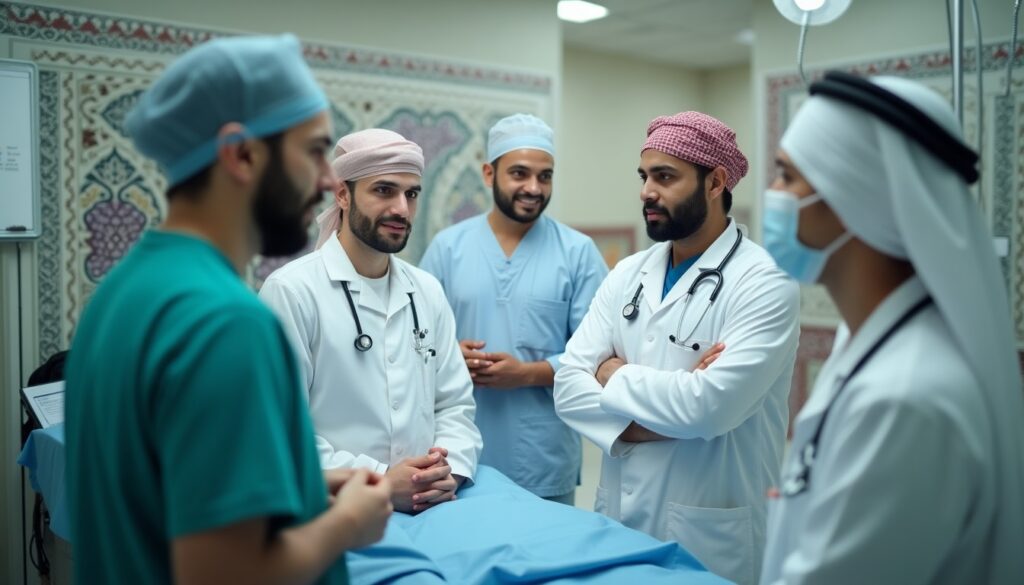
For international doctors like you, adapting to Saudi Arabia’s healthcare culture requires understanding and respect for local traditions while maintaining high professional standards. Your success in Saudi healthcare depends greatly on your ability to blend medical expertise with cultural sensitivity.
Medical Ethics
Across Saudi healthcare facilities, I’ve noticed that medical ethics are deeply intertwined with Islamic principles. You’ll need to understand that certain procedures may require additional considerations, such as gender-specific care preferences and religious obligations.
The Saudi Commission for Health Specialties (SCFHS) emphasizes that medical decisions must respect both international medical standards and local cultural values.
Patient Communication
Healthcare delivery in Saudi Arabia requires you to be mindful of unique communication protocols. Gender segregation is strictly observed, and you’ll often need to communicate with family members who act as patient representatives, especially when dealing with female patients. You’ll find that many patients prefer to receive medical information in Arabic, even if they understand English.
At most healthcare facilities, you’ll have access to translation services, but I strongly recommend developing basic Arabic medical terminology. Building trust with patients often depends on your ability to show respect for their cultural preferences while delivering quality care.
Professional Etiquette
Any international doctor working in Saudi healthcare should understand that professional relationships follow distinct cultural norms. You’ll notice that maintaining appropriate physical distance and using proper titles are important aspects of daily interactions. The workplace atmosphere tends to be more formal than in Western healthcare settings.
But beyond these formal requirements, I want you to know that developing cultural competence will significantly enhance your professional experience. Building positive relationships with colleagues often involves participating in social customs, such as sharing meals during Ramadan or attending important cultural celebrations.
Living in Saudi Arabia
Many international doctors find Saudi Arabia to be a unique blend of traditional values and modern lifestyle, offering both professional growth and cultural experiences. I’ve seen how the country provides tax-free income and excellent healthcare facilities, making it an attractive destination for medical professionals worldwide.
Housing Arrangements
For most international doctors, housing arrangements are typically part of your employment package. You’ll find that many hospitals provide fully furnished accommodation in compounds or apartment complexes, often located near your workplace. These compounds usually feature modern amenities including swimming pools, gymnasiums, and shopping facilities.
I recommend discussing housing details with your employer early on, as accommodations can vary significantly. Some hospitals offer housing allowances instead of direct accommodation, giving you the flexibility to choose your preferred location and type of residence.
Family Considerations
Considerations for bringing your family to Saudi Arabia should be carefully evaluated. You’ll find excellent international schools for your children, and many compounds provide a comfortable environment for families. However, it’s important to note that visa processes for family members can take several weeks to complete.
This aspect of relocating requires careful planning, especially regarding education options. I can tell you that most major cities have reputable international schools following American, British, or IB curricula, with annual fees ranging from $8,000 to $25,000 per child.
Social Integration
One of the most interesting aspects of living in Saudi Arabia is the social environment. You’ll discover a growing expatriate community that offers support and friendship. I’ve found that compound living provides natural opportunities for socializing with other international professionals and their families.
Further social integration opportunities exist through professional networks and community groups. You can join medical associations, participate in cultural events, and engage in various recreational activities within the compounds, helping you build a fulfilling social life while respecting local customs and traditions.
Career Benefits and Opportunities

To succeed as an international doctor in Saudi Arabia, you’ll find numerous advantages that can significantly enhance your medical career. The Saudi healthcare system offers a unique blend of professional growth, financial rewards, and research opportunities that can shape your future in remarkable ways.
Financial Advantages
Any international doctor working in Saudi Arabia can expect highly competitive tax-free salaries, often ranging between $50,000 to $150,000 annually, depending on your specialization and experience. I’ve found that the compensation package typically includes attractive benefits such as free accommodation, annual flight tickets, and comprehensive health insurance for you and your family.
Professional Growth
Against the backdrop of Saudi Arabia’s rapidly evolving healthcare sector, you’ll find exceptional opportunities for career advancement. I can tell you that the country’s medical facilities are equipped with state-of-the-art technology, allowing you to gain experience with the latest medical innovations and treatments.
To advance your career further, you’ll have access to continuous medical education programs and specialized training opportunities. The Saudi Commission for Health Specialties regularly organizes workshops, conferences, and certification programs to help you stay at the forefront of medical developments.
Research Possibilities
Around the major cities like Riyadh, you’ll discover well-funded research centers and academic institutions. I’ve noticed that Saudi Arabia is increasingly investing in medical research, with annual healthcare spending exceeding $45 billion, creating numerous opportunities for clinical trials and research projects.
Even as a practicing physician, you can participate in collaborative international research programs and publish in prestigious medical journals. The country’s commitment to becoming a regional hub for medical excellence means you’ll have access to substantial research grants and cutting-edge facilities.
Common Challenges and Solutions
Language Barriers
Unlike practicing in your home country, working in Saudi Arabia requires proficiency in both English and Arabic. I want to emphasize that any international doctor must achieve at least a B2 level in Arabic to effectively communicate with patients and colleagues. You’ll find that language barriers can significantly impact your daily practice, especially when dealing with local patients who may only speak Arabic.
Any successful transition requires dedicated language preparation. I recommend starting Arabic lessons well before your relocation, as investing in language skills early can reduce workplace stress by up to 40%. You might also consider joining medical Arabic courses specifically designed for healthcare professionals.
Administrative Hurdles
By far, one of the most challenging aspects I’ve observed is navigating the complex documentation requirements. You’ll need to prepare for lengthy verification processes that can take 2-4 months through DataFlow and ensure all your certificates meet SCFHS standards. Managing these administrative tasks requires patience and attention to detail.
In addition, I’ve found that maintaining clear communication with regulatory bodies is necessary. Regular follow-ups and keeping digital copies of all submissions can help you track your application progress and respond quickly to any requests for additional information.
Cultural Adaptation
Solutions to cultural adaptation challenges begin with understanding Saudi Arabia’s unique healthcare environment. I recommend familiarizing yourself with local customs, dress codes, and professional etiquette. You’ll find that respecting gender segregation in healthcare settings and understanding prayer time schedules are particularly important aspects of your daily practice.
Indeed, successful cultural integration goes beyond the workplace. I’ve seen that doctors who actively participate in cultural orientation programs have a 75% higher satisfaction rate in their first year of practice. You might want to connect with other international medical professionals who can share their experiences and provide valuable insights.
First Medical Consultancy Services
Once again, I want to emphasize that obtaining a medical license in Saudi Arabia can be complex, but with professional guidance, you can navigate this process effectively.
Application Assistance
On your journey to getting licensed in Saudi Arabia, I’ll help you understand that professional application assistance can make a significant difference in approval rates. My team at First Medical Consultancy provides comprehensive support in completing your SCFHS application, ensuring all requirements are met with precision.
On average, doctors who use professional application assistance services are 40% more likely to receive approval on their first attempt. I’ll guide you through each step, helping you avoid common pitfalls that could delay your application process.
Document Processing
The document processing phase requires careful attention to detail and proper organization. I’ll help you prepare all necessary documentation, including your medical degree, professional certificates, and work experience letters, ensuring they meet SCFHS strict verification standards.
Understanding the complexities of document processing, I want to emphasize that proper document authentication through DataFlow is mandatory for all international medical professionals. My team will guide you through this crucial verification process, which typically takes 15-30 working days.
Career Guidance
Document preparation is just the beginning – I’ll also provide comprehensive career guidance to help you maximize your professional opportunities in Saudi Arabia. From selecting the right healthcare facility to understanding salary packages, my expertise will help you make informed decisions about your medical career.
In addition to technical support, I offer valuable insights about the growing healthcare sector in Saudi Arabia, where medical professionals can expect competitive tax-free salaries and excellent benefits packages. My guidance includes tips on workplace culture, professional development opportunities, and strategies for long-term career success in the Kingdom.
To wrap up
Presently, I want to emphasize that your journey to medical licensing in Saudi Arabia can be a smooth and rewarding experience when you have the right guidance and preparation.
I understand that the process might seem complex at first, but I assure you that with proper planning and support, you can successfully navigate through each requirement, from document verification to passing the SMLE.
I encourage you to take advantage of all the resources and support systems available to make your transition into the Saudi healthcare system as seamless as possible. Whether you need help with DataFlow verification or guidance through the Mumaris Plus portal, my team and I are here to support your professional journey.
Your success in obtaining your medical license in Saudi Arabia is within reach, and I’m confident that your expertise will make a valuable contribution to the Kingdom’s healthcare sector.
FAQ
Q: What are the basic eligibility requirements for medical licensing in Saudi Arabia?
A: International doctors must have a recognized medical degree from an accredited institution, minimum 2 years of clinical experience post-graduation, and valid professional qualifications from their home country. They also need to pass the Saudi Medical Licensing Exam (SMLE) and demonstrate basic Arabic language proficiency. All educational certificates must undergo Primary Source Verification through DataFlow.
Q: How long does the entire licensing process typically take?
A: The complete medical licensing process in Saudi Arabia typically takes 4-6 months. This timeline includes document verification (1-2 months), SMLE examination preparation and completion (2-3 months), and final license processing through Mumaris Plus (1 month). However, timelines may vary based on individual circumstances and document processing efficiency.
Q: What documents are required for the licensing application?
A: Required documents include original medical degree certificates, valid home country medical license, detailed work experience certificates, passport copy, recent photographs, completed application form through Mumaris Plus, SMLE exam results, and Arabic language proficiency certificate. All documents must be translated into Arabic by certified translators and authenticated by relevant authorities.
Q: How much does the medical licensing process cost in Saudi Arabia?
A: The total cost ranges from 5,000-7,000 SAR (approximately $1,300-$1,900 USD). This includes DataFlow verification fees (2,000 SAR), SMLE examination fee (1,500 SAR), license processing fee (1,000 SAR), and document translation and authentication costs (500-2,500 SAR). Additional costs may apply for certificate renewals and specialty classifications.
Q: Can I practice immediately after receiving my medical license?
A: No, after receiving your medical license, you must obtain additional clearances including a work permit (Iqama), hospital privileges, and complete mandatory orientation programs. You’ll also need to register with the specific healthcare facility where you’ll be practicing and obtain the necessary institutional credentials. This process typically takes 2-4 weeks after license issuance.

